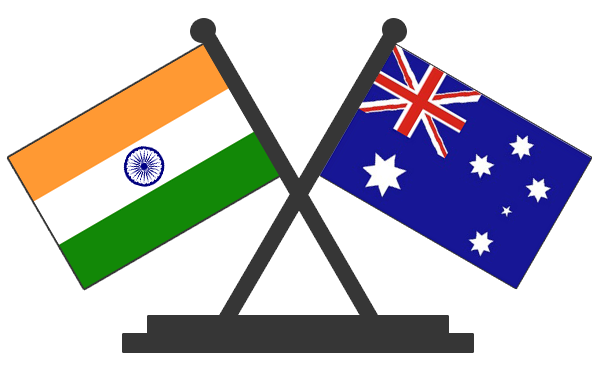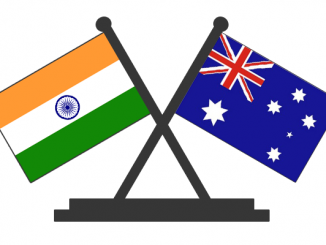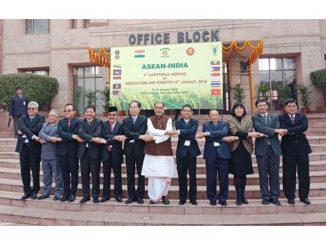
Apr 02:The Minister of Commerce and Industry, Minister of Consumer Affairs, Food and Public Distribution, and Minister of Textiles, Government of India, Shri Piyush Goyal, and Minister for Trade, Tourism and Investment, Government of Australia, Mr. Dan Tehan, MP, signed the India-Australia Economic Cooperation and Trade Agreement today, in a Virtual ceremony in presence of the Prime Minister of India, Shri Narendra Modi and Prime Minister of Australia, Mr. Scott Morrison.
The salient features of the India-Australia ECTA are as follows:
The India-Australia ECTA is the first trade agreement of India with a developed country after more than a decade. The Agreement encompasses cooperation across the entire gamut of bilateral economic and commercial relations between the two friendly countries and covers areas like Trade in Goods, Rules of Origin, Trade in Services, Technical Barriers to Trade (TBT), Sanitary and Phytosanitary (SPS) measures, Dispute Settlement, Movement of Natural Persons, Telecom, Customs Procedures, Pharmaceutical products, and Cooperation in other Areas. Eight subject-specific side letters covering various aspects of bilateral economic cooperation were also concluded as part of the Agreement.
Impact or benefits:
ECTA provides for an institutional mechanism to encourage and improve trade between the two countries. The ECTA between India and Australia covers almost all the tariff lines dealt in by India and Australia respectively. India will benefit from preferential market access provided by Australia on 100% of its tariff lines. This includes all the labor-intensive sectors of export interest to India such as Gems and Jewellery, Textiles, leather, footwear, furniture, food, agricultural products, engineering products, medical devices, and Automobiles. On the other hand, India will be offering preferential access to Australia on over 70% of its tariff lines, including lines of export interest to Australia which are primarily raw materials and intermediaries such as coal, mineral ores and wines, etc.
As regards trade in services, Australia has offered wide-ranging commitments in around 135 sub-sectors and Most Favoured Nation (MFN) in 120 sub-sectors which cover key areas of India’s interest like IT, ITES, Business services, Health, Education, and Audiovisual. Some of the keys offered by Australia in the services space include a Quota for chefs and yoga teachers; a Post-study work visa of 2-4 years for Indian students on a reciprocal basis; mutual recognition of Professional Services and Other licensed/regulated Occupations; and Work & Holiday visa arrangement for young professionals. On the other hand, India has offered market access to Australia in around 103 sub-sectors and Most Favoured Nation in 31 sub-sectors from the 11 broad service sectors such as ‘business services’, ‘communication services’, ‘construction and related engineering services, and so on. Both sides have also agreed to a separate Annex on Pharmaceutical products under this agreement, which will enable fast-track approval for patented, generic, and biosimilar medicines.
Timelines:
The negotiations for India-Australia ECTA were formally re-launched on 30 September 2021 and concluded on a fast-track basis by the end of March 2022.
Background:
India and Australia enjoy excellent bilateral relations that have undergone transformative evolution in recent years, developing along a positive track, into a friendly partnership. This is a special partnership characterized by shared values of pluralistic, parliamentary democracies, Commonwealth traditions, expanding economic engagement, long-standing people-to-people ties, and increasing high-level interaction. The India-Australia Comprehensive Strategic Partnership initiated during the India-Australia Leaders’ Virtual Summit held between Hon’ble Prime Minister of India His Excellency Shri Narendra Modi and Hon’ble Prime Minister of Australia His Excellency Mr. Scott Morrison MP, on 04 June 2020 is the cornerstone of our multi-faceted bilateral relations.
Growing India-Australia economic and commercial relations contribute to the stability and strength of a rapidly diversifying and deepening bilateral relationship between the two countries. India and Australia have been each other’s, important trading partners. These excellent bilateral economic and commercial relations have continued to enhance and deepen over time. Australia is the 17th largest trading partner of India and India is Australia’s 9th largest trading partner. India-Australia bilateral trade for both merchandise and services is valued at US$ 27.5 billion in 2021. India’s merchandise exports to Australia grew 135% between 2019 and 2021. India’s exports consist primarily of a broad-based basket largely of finished products and were US$ 6.9 billion in 2021. India’s merchandise imports from Australia were US$ 15.1 billion in 2021, consisting largely of raw materials, minerals, and intermediate goods.
India and Australia are partners in the trilateral Supply Chain Resilience Initiative (SCRI) arrangement along with Japan which seeks to enhance the resilience of supply chains in the Indo-Pacific Region. Further, India and Australia are also members of the recently formed Quad, also comprising the US, and Japan, to further enhance cooperation and develop partnerships across several issues of common concerns.
The India-Australia ECTA will further cement the already deep, close, and strategic relations between the two countries and will significantly enhance bilateral trade in goods and services, create new employment opportunities, raise living standards, and improve the general welfare of the people of the two countries.
****
Disclaimer: We donot claim that the images used as part of the news published are always owned by us. From time to time, we use images sourced as part of news or any related images or representations. Kindly take a look at our image usage policy on how we select the image that are used as part of the news.


